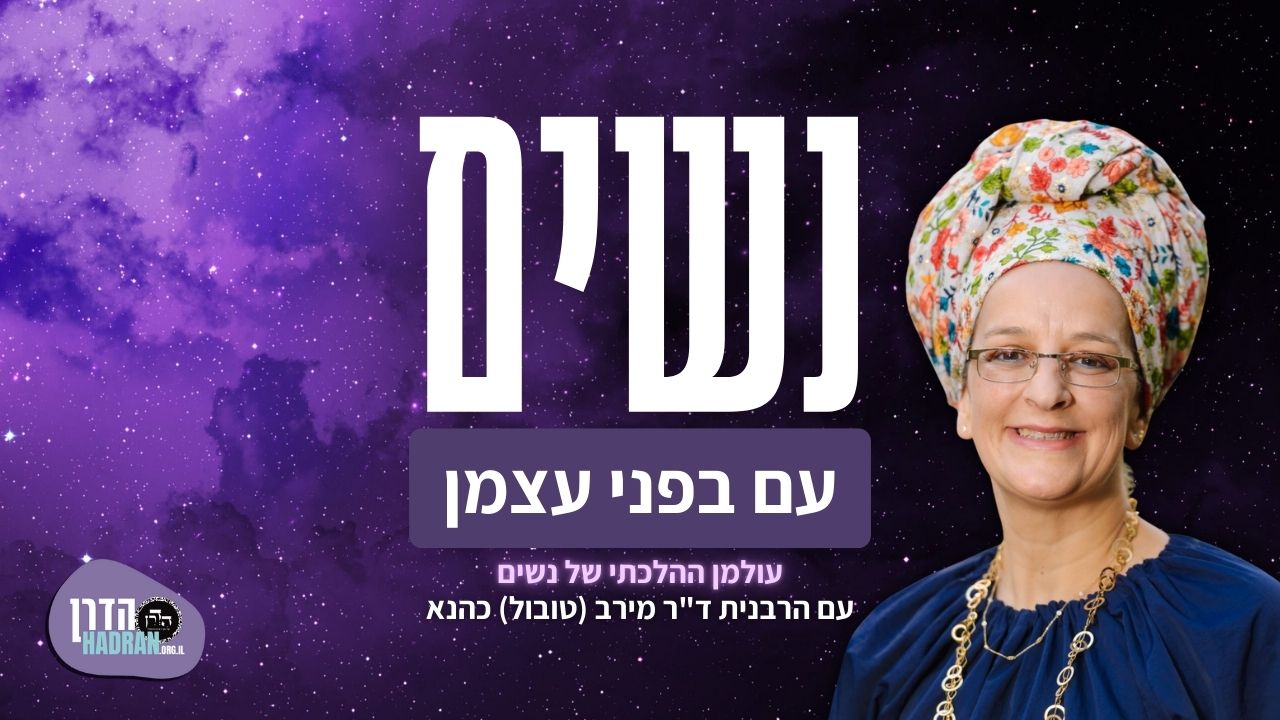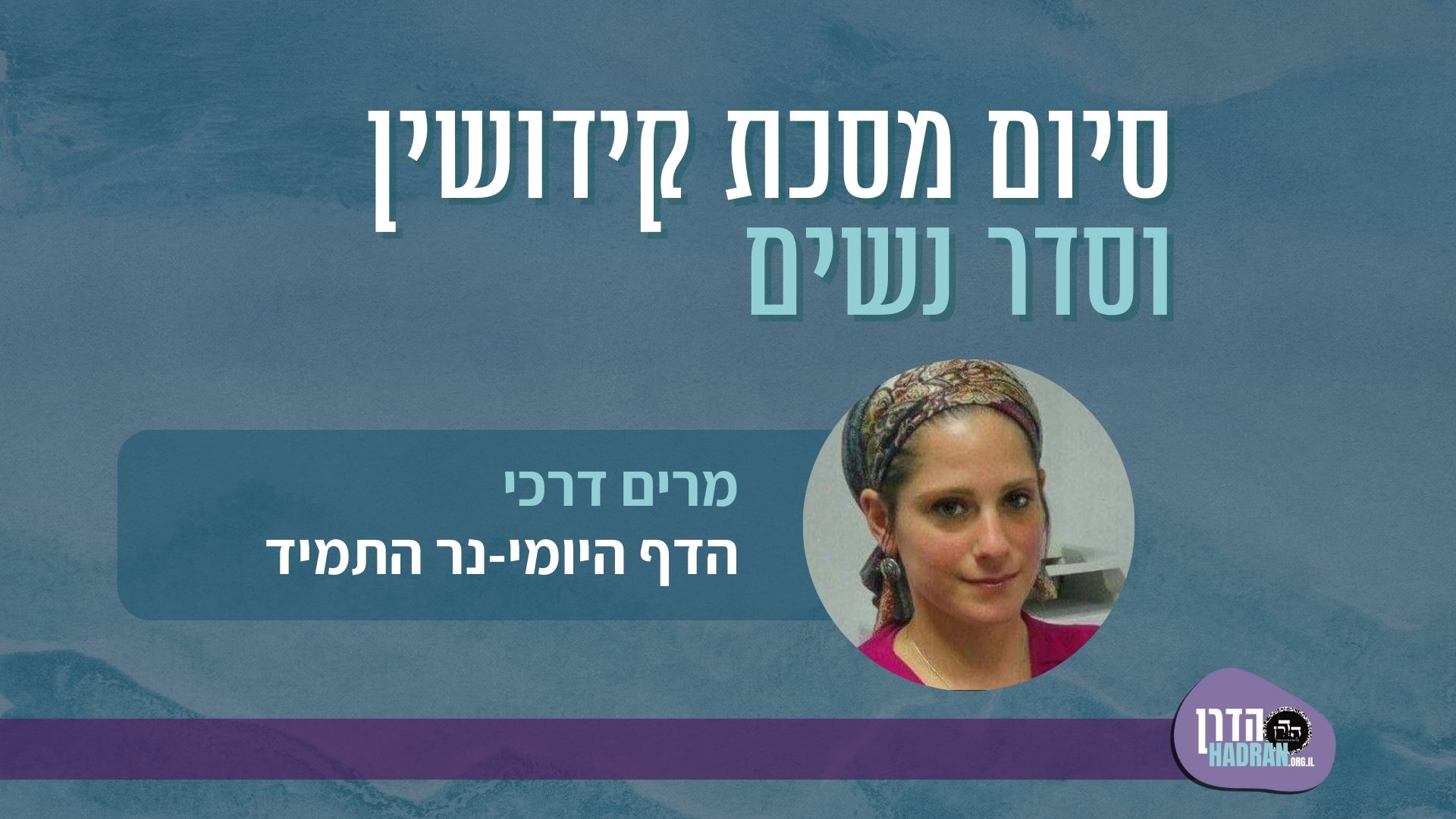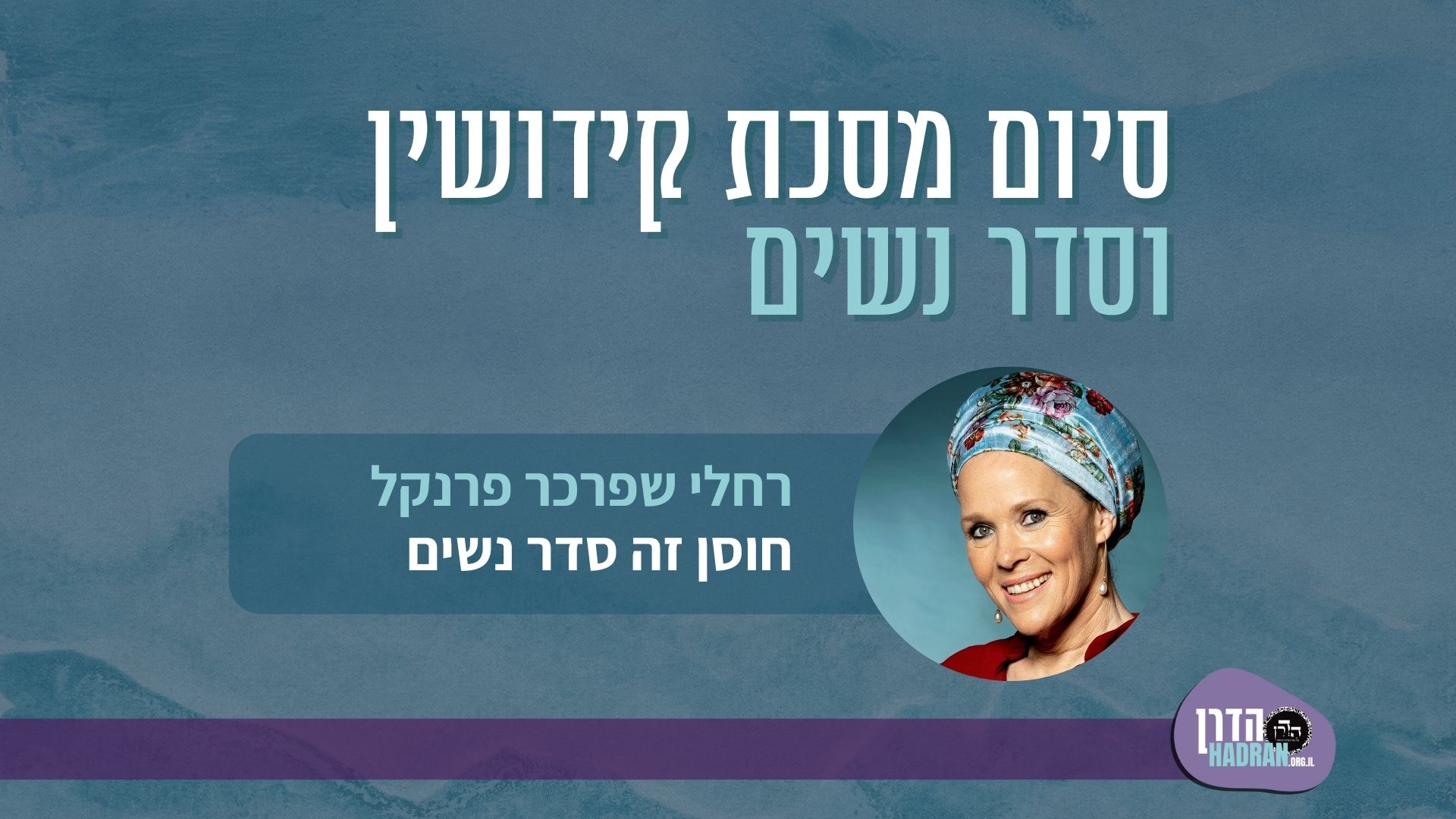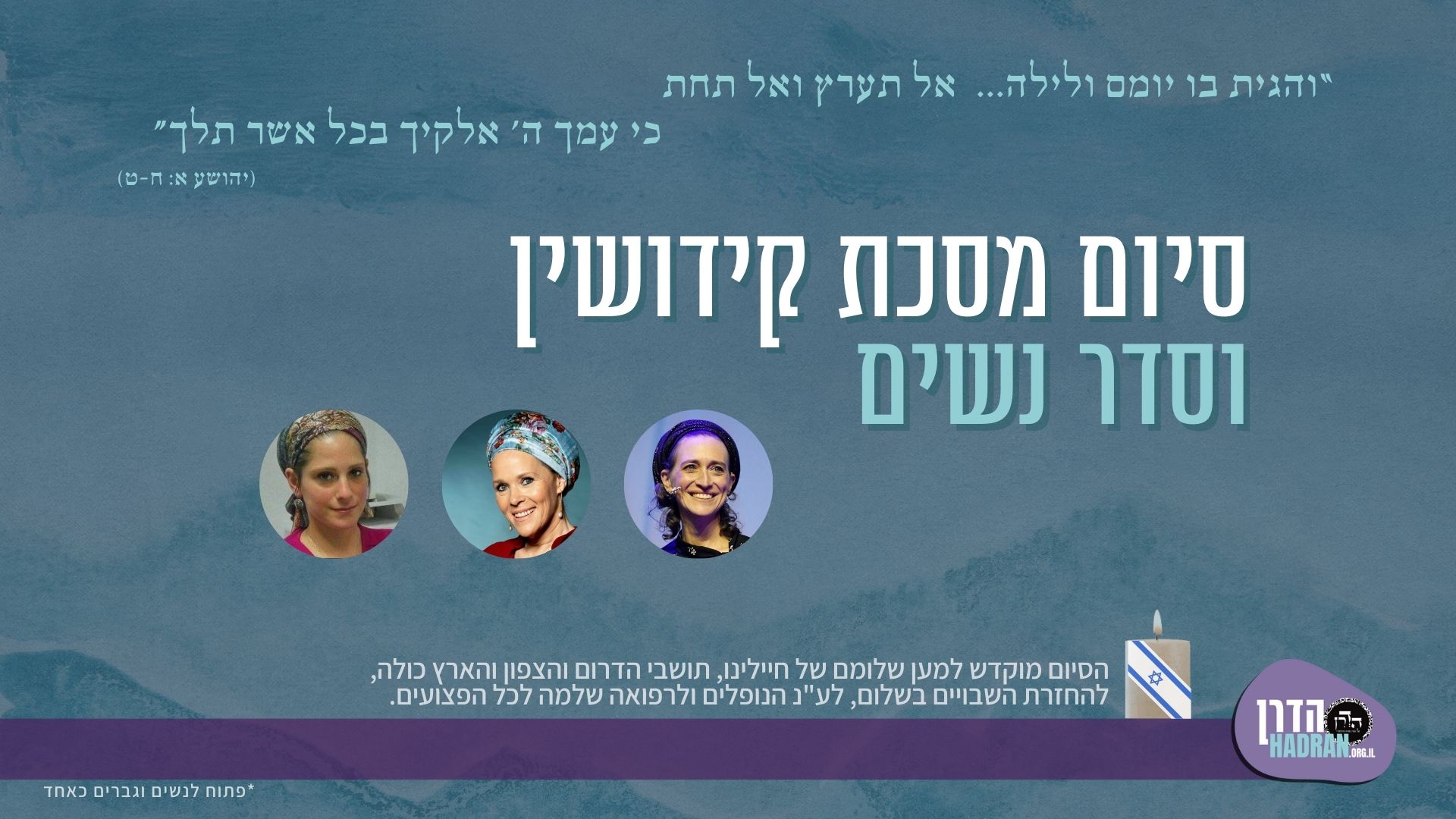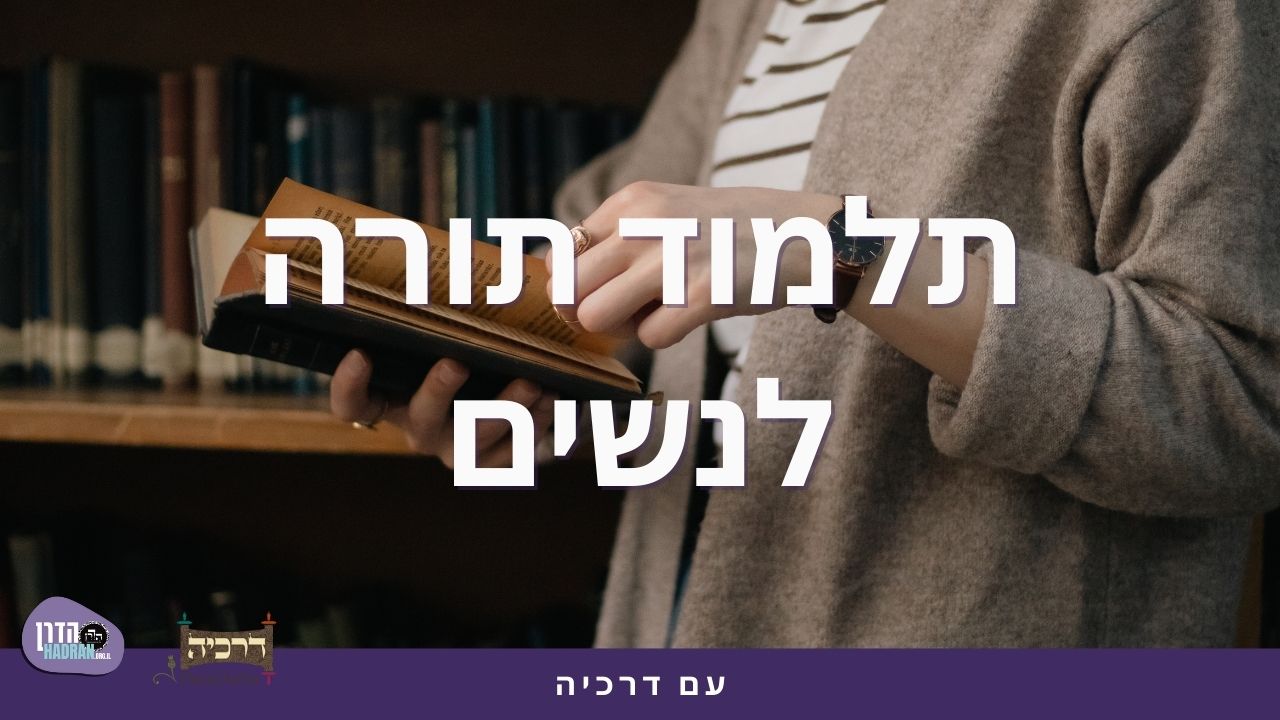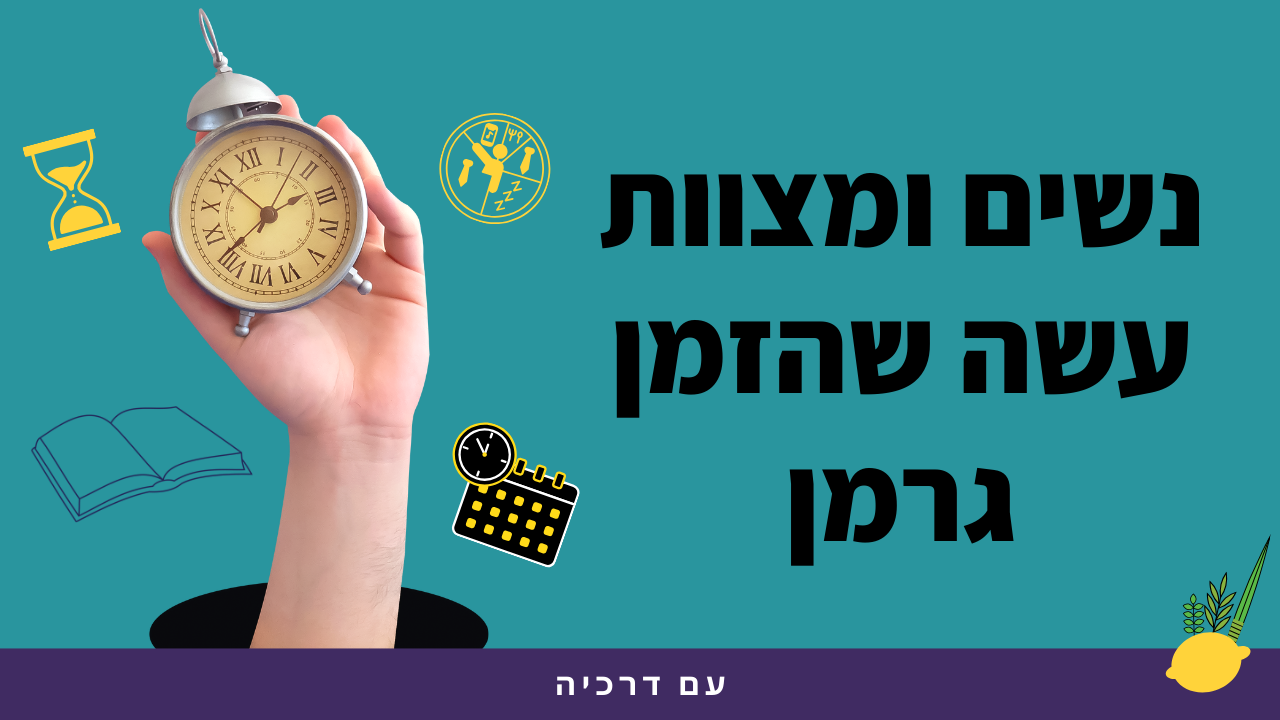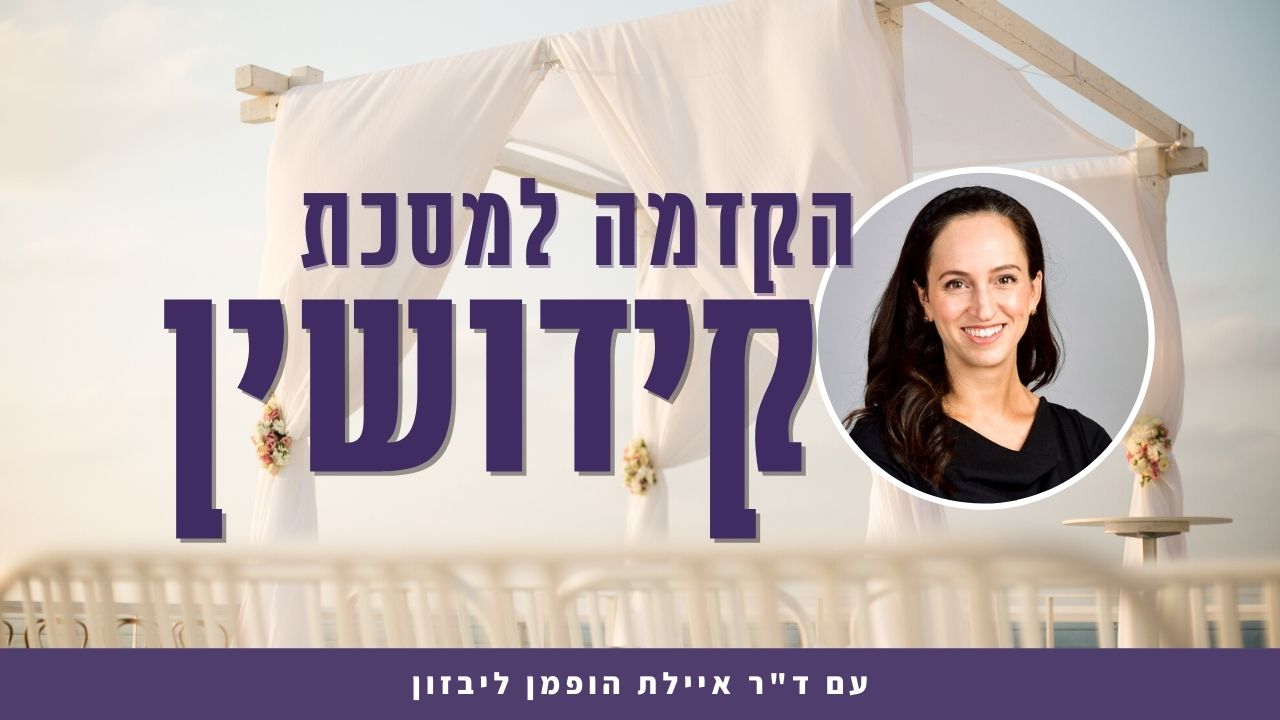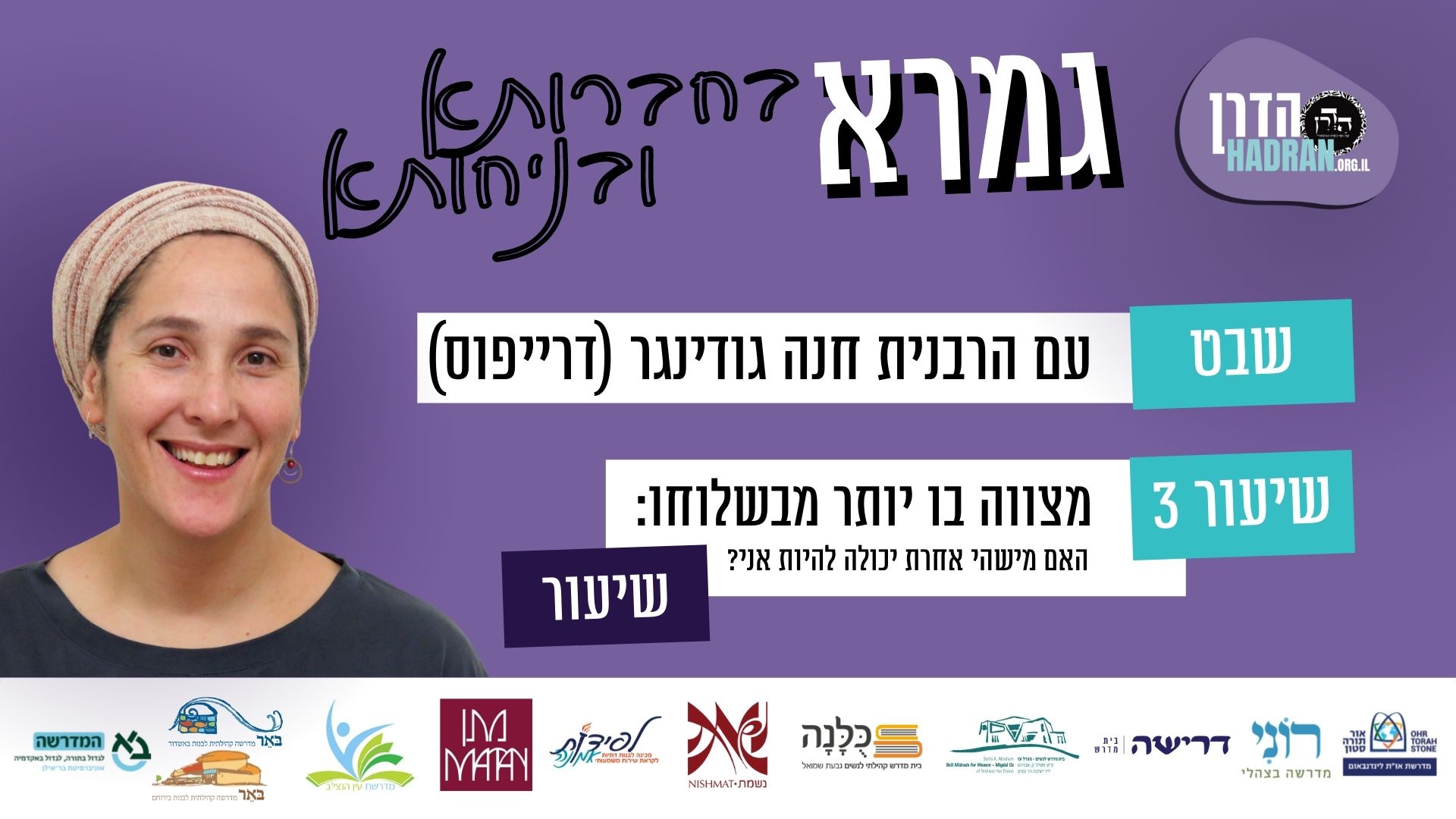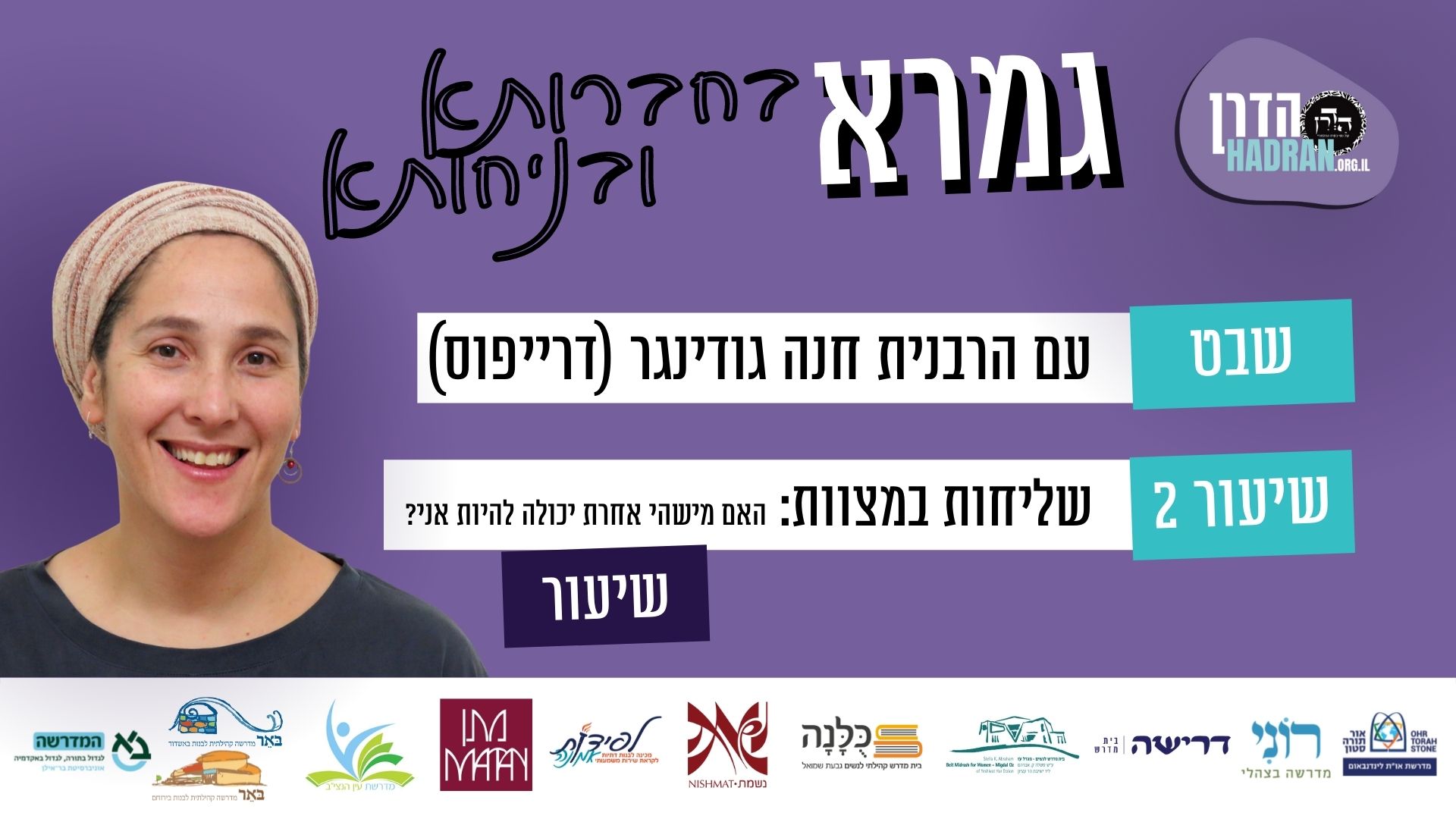הלימוד השבוע מוקדש לזכות ולשלום הַיְימׇנוֹט אֱמוּנָה בַּת באנצ’י (קָסָאוּ) בת 11 שנעלמה במקום מגוריה בצפת, לפני שנתיים, ביום ט”ז אדר תשפ”ד (25.2.24), ולא נודעו עקבותיה.
הלימוד השבוע מוקדש למען ביטחון המדינה, החיילים והאזרחים, ולמען חירותו של העם האיראני. שנזכה בקרוב שיתקיים בנו הפסוק: "לַיְּהוּדִים הָיְתָה אוֹרָה וְשִׂמְחָה וְשָׂשֹׂן וִיקָר”.
הלימוד השבוע מוקדש לזכות וְלִשְׁלוֹם הָיימָנוֹט אֱמוּנָה בַּת באנצ’י (קָסָאוּ), בת 11 שנעלמה במקום מגוריה בצפת, לפני שנתיים, ביום ט”ז אדר תשפ״ד (25.2.24), ולא נודעו עקבותיה. אנו מתפללים שֶׁתִּמָּצֵא וְתוּשַׁב לביתה במהרה!
רוצה להקדיש שיעור?

כלים
הלימוד השבוע מוקדש לזכות ולשלום הַיְימׇנוֹט אֱמוּנָה בַּת באנצ’י (קָסָאוּ) בת 11 שנעלמה במקום מגוריה בצפת, לפני שנתיים, ביום ט”ז אדר תשפ”ד (25.2.24), ולא נודעו עקבותיה.
הלימוד השבוע מוקדש למען ביטחון המדינה, החיילים והאזרחים, ולמען חירותו של העם האיראני. שנזכה בקרוב שיתקיים בנו הפסוק: "לַיְּהוּדִים הָיְתָה אוֹרָה וְשִׂמְחָה וְשָׂשֹׂן וִיקָר”.
הלימוד השבוע מוקדש לזכות וְלִשְׁלוֹם הָיימָנוֹט אֱמוּנָה בַּת באנצ’י (קָסָאוּ), בת 11 שנעלמה במקום מגוריה בצפת, לפני שנתיים, ביום ט”ז אדר תשפ״ד (25.2.24), ולא נודעו עקבותיה. אנו מתפללים שֶׁתִּמָּצֵא וְתוּשַׁב לביתה במהרה!
כלים
העמקה
רוצה להבין מה באמת קורה מתחת לפני השטח של הסוגיה?
שיעורים, פודקאסטים והרחבות של מיטב המורות שלנו יפתחו לך עוד זוויות וכיווני חשיבה.
חדשה בלימוד הגמרא?
זה הדף הראשון שלך? איזו התרגשות עצומה! יש לנו בדיוק את התכנים והכלים שיעזרו לך לעשות את הצעדים הראשונים ללמידה בקצב וברמה שלך, כך תוכלי להרגיש בנוח גם בתוך הסוגיות המורכבות ומאתגרות.
פסיפס הלומדות שלנו
גלי את קהילת הלומדות שלנו, מגוון נשים, רקעים וסיפורים. כולן חלק מתנועה ומסע מרגש ועוצמתי.
קידושין ג
הָתָם הָא קָמַשְׁמַע לַן, דְּדַרְכֵּיהּ דְּאֶתְרוֹג כְּיָרָק – מָה יָרָק דַּרְכּוֹ לִיגְדַּל עַל כׇּל מַיִם וּבִשְׁעַת לְקִיטָתוֹ עִישּׂוּרוֹ, אַף אֶתְרוֹג דַּרְכּוֹ לִיגְדַּל עַל כׇּל מַיִם וּבִשְׁעַת לְקִיטָתוֹ עִישּׂוּרוֹ.
The Gemara explains: There, the mishna teaches us this, that the way an etrog grows is like a vegetable: Just as it is the way of a vegetable to grow by being watered by all water, i.e., in addition to rainwater it requires irrigation, and its tithing is according to when it is harvested, i.e., its tithing is based on when it is collected from the field, so too, it is the way of an etrog to grow by being watered by all water, as it requires more water than rain provides, and its tithing is according to the time when it is harvested. If, for example, a vegetable is collected during a year when poor man’s tithe is given, that tithe is separated from it, even if it formed a bud during the previous year, when second tithe was separated. The same applies to an etrog. Therefore, the mishna specifically uses the term: Way, to allude to this reason.
וְהָא דִּתְנַן: ״כּוֹי – יֵשׁ בּוֹ דְּרָכִים שָׁוֶה לַחַיָּה, וְיֵשׁ בּוֹ דְּרָכִים שָׁוֶה לַבְּהֵמָה, וְיֵשׁ בּוֹ דְּרָכִים שָׁוֶה לַחַיָּה וְלַבְּהֵמָה, וְיֵשׁ בּוֹ דְּרָכִים שֶׁאֵינוֹ שָׁוֶה לֹא לַחַיָּה וְלֹא לַבְּהֵמָה״. נִיתְנֵי ״דְּבָרִים״! וְתוּ, הָא דִּתְנַן: ״זוֹ אַחַת מִן הַדְּרָכִים שֶׁשָּׁווּ גִּיטֵּי נָשִׁים לְשִׁחְרוּרֵי עֲבָדִים״, נִיתְנֵי ״דְּבָרִים״!
The Gemara further asks: But concerning that which we learned in a mishna (Bikkurim 2:8): With regard to a koy, an animal whose classification was uncertain, as the Sages were unsure whether it is a domesticated or a non-domesticated animal, there are ways, i.e., halakhot, in which its halakhot correspond to those of a non-domesticated animal and there are ways in which its halakhot correspond to those of a domesticated animal. And there are ways in which its halakhot correspond to those of both a non-domesticated animal and a domesticated animal, and there are ways in which its halakhot correspond to those of neither a non-domesticated animal nor a domesticated animal. Let that mishna teach the term: Matters. And furthermore, with regard to that which we learned in a mishna (Gittin 9a): This is one of the ways in which the halakhot of bills of divorce correspond to those of bills of manumission, let that mishna teach the word: Matters.
אֶלָּא, כֹּל הֵיכָא דְּאִיכָּא פְּלוּגְתָּא תָּנֵי ״דְּרָכִים״, וְכֹל הֵיכָא דְּלֵיכָּא פְּלוּגְתָּא תָּנֵי ״דְּבָרִים״. דַּיְקָא נָמֵי, דְּקָתָנֵי סֵיפָא: ״רַבִּי אֱלִיעֶזֶר אוֹמֵר: אֶתְרוֹג שָׁוֶה לָאִילָן לְכׇל דָּבָר״. שְׁמַע מִינַּהּ.
Rather, the Gemara rejects the previous explanations, as the phraseology is not dependent on the nature of the topic at hand. Instead, anywhere that there is a distinction with regard to an issue the mishna teaches the term: Ways, as there are different ways or possibilities available. And anywhere that there is no distinction it teaches the word: Matters. The Gemara comments: The language of the mishna is also precise in this regard, as it teaches in the latter clause of that mishna that Rabbi Eliezer says: The halakhot of an etrog tree correspond to those of a tree with regard to every matter. This indicates that when no distinctions apply, the mishna will use the term matter. The Gemara concludes: Learn from this clause in the mishna that this explanation is correct.
מִנְיָינָא דְרֵישָׁא לְמַעוֹטֵי מַאי, מִנְיָינָא דְסֵיפָא לְמַעוֹטֵי מַאי?
§ The Gemara continues to analyze the language of the mishna: With regard to the number in the first clause of the mishna, i.e., a woman is acquired in three ways, this serves to exclude what? The fact that the mishna mentions a number indicates that other modes of acquisition do not apply to betrothal. What mode is excluded? Similarly, the number in the latter clause of the mishna, that a woman acquires herself in two ways, serves to exclude what?
מִנְיָינָא דְרֵישָׁא – לְמַעוֹטֵי חוּפָּה. וּלְרַב הוּנָא, דְּאָמַר חוּפָּה קוֹנָה מִקַּל וָחוֹמֶר, לְמַעוֹטֵי מַאי?
The Gemara explains: The number in the first clause serves to exclude a wedding canopy, which does not effect betrothal. The Gemara asks: And according to the opinion of Rav Huna, who said: A wedding canopy acquires a woman, and it alone could be a mode of betrothal, as derived by an a fortiori inference (see 5a), this number serves to exclude what?
לְמַעוֹטֵי חֲלִיפִין. סָלְקָא דַּעְתָּךְ אָמֵינָא, הוֹאִיל וְגָמַר ״קִיחָה״ ״קִיחָה״ מִשְּׂדֵה עֶפְרוֹן – מָה שָׂדֶה מִקַּנְיָא בַּחֲלִיפִין, אַף אִשָּׁה נָמֵי מִקַּנְיָא בַּחֲלִיפִין, קָמַשְׁמַע לַן.
The Gemara answers: The number serves to exclude acquisition through symbolic exchange, i.e., a pro forma act of acquisition effecting the transfer of ownership of an article. Although a woman can be betrothed by means of money or an item of monetary value, she is not betrothed if she is given an item by symbolic exchange. The Gemara explains why this needs to be excluded: It might enter your mind to say that since the Sages derive the acquisition of a woman by verbal analogy between the term expressing taking stated with regard to betrothal from the term expressing taking with regard to the field of Ephron, it can be suggested that just as a field can be acquired through symbolic exchange, so too, a woman can be acquired through symbolic exchange. Therefore, the tanna teaches us that this is not the case.
וְאֵימָא הָכִי נָמֵי! חֲלִיפִין אִיתַנְהוּ בְּפָחוֹת מִשָּׁוֶה פְּרוּטָה, וְאִשָּׁה בְּפָחוֹת מִשָּׁוֶה פְּרוּטָה
The Gemara asks: And perhaps one should say that so too, it is possible to betroth a woman by means of symbolic exchange. The Gemara answers: This cannot be the case, as symbolic exchange is effective using an item worth less than the value of one peruta, and with an item worth less than the value of one peruta, a woman
לָא מַקְנְיָא נַפְשַׁהּ.
does not render herself acquired by a man.
מִנְיָינָא דְסֵיפָא לְמַעוֹטֵי מַאי – לְמַעוֹטֵי חֲלִיצָה. סָלְקָא דַּעְתָּךְ אָמֵינָא: תֵּיתֵי בְּקַל וָחוֹמֶר מִיְּבָמָה, מָה יְבָמָה שֶׁאֵינָהּ יוֹצְאָה בְּגֵט – יוֹצְאָה בַּחֲלִיצָה, זוֹ, שֶׁיּוֹצְאָה בְּגֵט – אֵינוֹ דִּין שֶׁיּוֹצְאָה בַּחֲלִיצָה? קָמַשְׁמַע לַן.
The Gemara asks: The number in the latter clause of the mishna, that a woman acquires herself in two ways, serves to exclude what? The Gemara answers that it serves to exclude ḥalitza, i.e., a woman is not released from marriage through ḥalitza. Without this exclusion it might enter your mind to say that this can be derived through an a fortiori inference from the halakha of a yevama, as follows: Just as a yevama, who is not released from the yavam through a bill of divorce, is nevertheless released from him through ḥalitza, with regard to this married woman, who can be released from her husband through a bill of divorce, is it not logical that she can be released from him through ḥalitza? Therefore, the tanna teaches us that a married woman cannot be released from her husband by means of ḥalitza.
וְאֵימָא הָכִי נָמֵי! אָמַר קְרָא: ״סֵפֶר כְּרִיתֻת״ – סֵפֶר כּוֹרְתָהּ, וְאֵין דָּבָר אַחֵר כּוֹרְתָהּ.
The Gemara asks: And perhaps one should say that so too, this is the case, i.e., a married woman can be released from marriage through ḥalitza. The Gemara answers: The verse states with regard to divorce: “A scroll of severance” (Deuteronomy 24:3), which teaches: A scroll, i.e., a written document, severs her from her husband, and nothing else severs her from him.
בְּכֶסֶף. מְנָא לַן? וְתוּ, הָא דִּתְנַן: ״הָאָב זַכַּאי בְּבִתּוֹ בְּקִדּוּשֶׁיהָ, בְּכֶסֶף בִּשְׁטָר וּבְבִיאָה״, מְנָלַן דְּמִיקַּנְיָא בְּכֶסֶף, וְכֶסֶף דַּאֲבוּהּ הוּא?
§ The mishna teaches that a woman can be acquired with money. The Gemara asks: From where do we derive that a woman can be acquired through money? And furthermore, with regard to that which we learned in a mishna (Ketubot 46b): A father has authority over his daughter with regard to her betrothal, whether it is through money, through a document, or through sexual intercourse, from where do we derive that she is acquired by her husband with money, and that this money is her father’s?
אָמַר רַב יְהוּדָה אָמַר רַב: דְּאָמַר קְרָא ״וְיָצְאָה חִנָּם אֵין כָּסֶף״ – אֵין כֶּסֶף לְאָדוֹן זֶה, אֲבָל יֵשׁ כֶּסֶף לְאָדוֹן אַחֵר. וּמַאן נִיהוּ – אָב.
Rav Yehuda said that Rav said: The reason is that the verse states with regard to a Hebrew maidservant acquiring freedom from her master: “Then shall she go out for nothing, without money” (Exodus 21:11). The extraneous phrase: Without money, indicates that there is no money for this master, i.e., in this case the master she leaves loses the money he paid for her, but there is money for a different master, i.e., another master receives money for her when she leaves his authority. And who is the other master who can transfer her to someone else and receives money for her? This is her father.
וְאֵימָא לְדִידַהּ! הָכִי הַשְׁתָּא?! אָבִיהָ מְקַבֵּל קִידּוּשֶׁיהָ, דִּכְתִיב: ״אֶת בִּתִּי נָתַתִּי לָאִישׁ הַזֶּה״, וְאִיהִי שָׁקְלָה כַּסְפָּא?!
The Gemara asks: But why not say that this money is given to her? The Gemara rejects this: How can one suggest this? Her father receives her betrothal, i.e., the money or document of betrothal, when he marries her off to her husband, as it is written: “I gave my daughter to this man” (Deuteronomy 22:16), and shall she take the money? Since he is the one who marries her off, he is certainly entitled to the money of her betrothal.
וְאֵימָא הָנֵי מִילֵּי קְטַנָּה, דְּלֵית לַהּ יָד לְקַבֵּל קִידּוּשִׁין, אֲבָל נַעֲרָה, דְּאִית לַהּ יָד לְקַבֵּל קִידּוּשִׁין – תְּקַדֵּישׁ אִיהִי נַפְשָׁהּ וְתִשְׁקוֹל כַּסְפָּא! אָמַר קְרָא: ״בִּנְעֻרֶיהָ בֵּית אָבִיהָ״ – כׇּל שֶׁבַח נְעוּרִים לְאָבִיהָ.
The Gemara asks: But why not say that this halakha applies only when she is a minor girl, as she does not have the power to receive her betrothal. Since she lacks the intellectual capacity, she likewise does not have the legal right to conduct this transaction. But with regard to a young woman, who does have the power to receive her betrothal, as a female older than twelve years is considered an adult, let her betroth herself and take the money. The Gemara answers that the verse states: “Being in her youth, in her father’s house” (Numbers 30:17), which teaches: Any profit she gains in her youth belongs to her father.
וְאֶלָּא הָא דְּאָמַר רַב הוּנָא אָמַר רַב: מִנַּיִן שֶׁמַּעֲשֵׂה הַבַּת לָאָב? שֶׁנֶּאֱמַר: ״וְכִי יִמְכֹּר אִישׁ אֶת בִּתּוֹ לְאָמָה״, מָה אָמָה מַעֲשֵׂה יָדֶיהָ לְרַבָּהּ – אַף בַּת נָמֵי מַעֲשֵׂה יָדֶיהָ לְאָבִיהָ. תִּיפּוֹק לֵיהּ מִ״בִּנְעֻרֶיהָ בֵּית אָבִיהָ״!
The Gemara questions this explanation: But with regard to that which Rav Huna says that Rav says: From where is it derived that the earnings of a daughter, i.e., the profit from her labor, belongs to her father? As it is stated: “And if a man sells his daughter as a maidservant” (Exodus 21:7). This comparison between a daughter and a Hebrew maidservant teaches the following: Just as with regard to a Hebrew maidservant, her earnings belong to her master, so too, with regard to a daughter, her earnings belong to her father. The Gemara now asks: Why does Rav Huna need this derivation? Let him derive this halakha from the verse “being in her youth, in her father’s house,” which indicates that any profit from her earnings as a young woman belongs to her father.
אֶלָּא, בַּהֲפָרַת נְדָרִים הוּא דִּכְתִיב. הָכִי נָמֵי, בַּהֲפָרַת נְדָרִים הוּא דִּכְתִיב. וְכִי תֵּימָא נֵילַף מִינֵּיהּ – מָמוֹנָא מֵאִיסּוּרָא לָא יָלְפִינַן.
Rather, Rav Huna maintains that that verse is written with regard to the nullification of vows, and it is not referring to the halakhot of acquisition. The Gemara asks: If that is so, then so too, with regard to her betrothal money, one can say that this verse is written only with regard to the nullification of vows and does not apply to betrothal money. And if you would say: Let us derive the halakha of her betrothal money from the halakha of the nullification of vows, i.e., just as a father has the right to nullify his daughter’s vows when she is a young woman, so too, he has rights to her money, this is not possible, as there is a principle: We do not derive monetary matters from ritual matters.
וְכִי תֵּימָא נֵילַף מִקְּנָסָא – מָמוֹנָא מִקְּנָסָא לָא יָלְפִינַן.
And if you would say: Let us derive this halakha of the betrothal of a young woman from the halakha of fines, as it is stated explicitly in the Torah that a man who rapes a young woman must pay a fine to her father, there is another principle that is applicable here: We do not derive monetary matters from fines, as the imposition of a fine is considered a unique case from which ordinary monetary rights cannot be derived.
וְכִי תֵּימָא נֵילַף מִבּוֹשֶׁת וּפְגָם – שָׁאנֵי בּוֹשֶׁת וּפְגָם דַּאֲבוּהּ שָׁיֵיךְ בְּגַוַּיְיהוּ.
And if you would say: Let us derive this halakha from the reimbursements for the humiliation and degradation of a young woman who was raped, which are also given to the father, one can answer that the following distinction applies: Reimbursement for humiliation and degradation are different, as her father has an interest in them. The father has the ability to derive benefit from her humiliation and degradation in other ways, e.g., by marrying her to a man afflicted with boils, which would humiliate her and cause a reduction in her value. Therefore, one cannot derive from the fact that the father receives the reimbursements for the humiliation and degradation of a young woman who was raped that he receives other monies due to her.
אֶלָּא, מִסְתַּבְּרָא דְּכִי קָא מְמַעֵט –
Rather, the halakha that a young woman’s betrothal money belongs to her father is derived from the verse: “Then shall she go out for nothing, without money” (Exodus 21:11), as previously stated. As for the question why the money does not belong to her, the Gemara answers that it is reasonable that when the verse excludes another situation and indicates that there is no money for this master but there is money for a different master,
